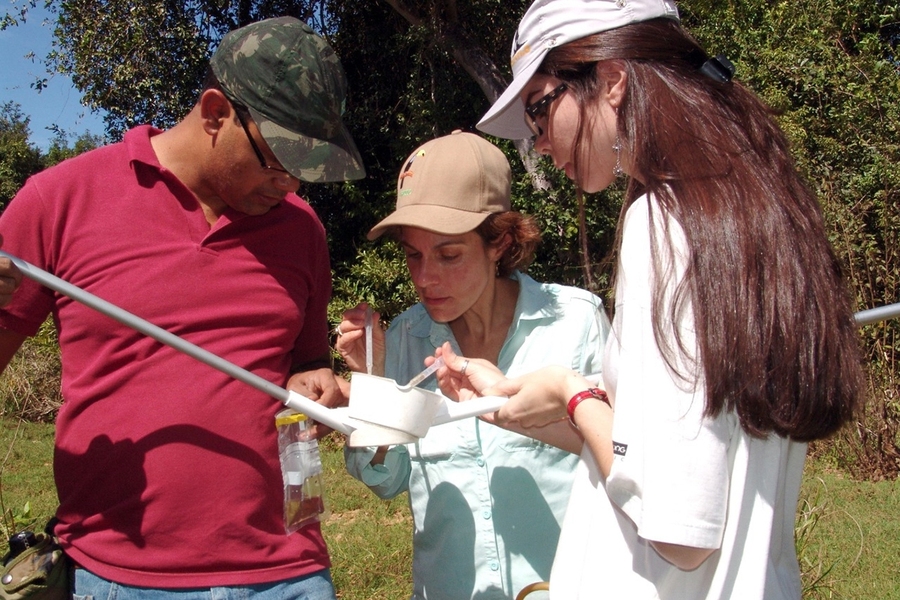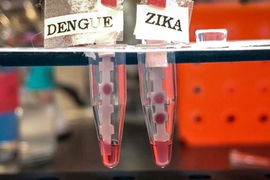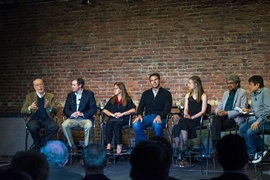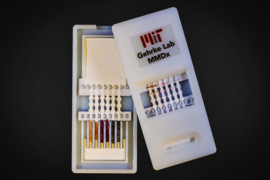An MIT Tata Center funded research team led by MIT Professor Lee Gehrke and collaborator Irene Bosch has developed a paper-based diagnostic test to detect Zika, dengue, chikungunya and other related viruses within minutes. To commercialize the venture, they recently formed life sciences startup, E25Bio, to not only change the way mosquito-borne illnesses are diagnosed, but also enable governments to effectively prevent an outbreak from turning into a public health crisis, especially in high-risk, resource-poor areas across the developing world.
Conventional methods deployed to test for infectious diseases typically require long lead times for sample collection and analysis. Led by E25Bio’s paper-based test, which functions similarly to an over-the-counter pregnancy test, is able to quickly and accurately identify Zika, dengue 1-4, and chikungunya at the point of care at an affordable cost. Currently, these viruses can be indistinguishable in symptomatic patients without the use of expensive equipment and trained lab technicians.
E25Bio recently received funding from MIT-backed venture firm The Engine to commercialize its technology.
The startup's rapid diagnostic test marks a leap in arthropod-borne virus diagnostics. Each of these distinct diagnoses calls for specific next steps in patient care, so a quick, accurate, low-cost method is a critical piece of the puzzle in resource-constrained communities. Elimination of cross-reactivity in the test also reduces the risk of misdiagnosis which often leads to inaccurate or insufficient treatment in the best case and death in the worst case. E25Bio’s test is supported by an accompanying mobile app that catalogues the results of the test by time and location. This real-time data could potentially enable governments to take preventative steps to control the spread of disease and avoid an epidemic.
As a Venezuelan, and an expert in epidemics and tropical public health, Bosch has spent decades in the field perfecting her research. Her familiarity with the devastating consequences of infectious disease outbreaks, and the frustrating inefficiencies and ineffectiveness of the current methods in place to combat them, has served as a constant reminder of the need to develop a robust infectious disease response system. When asked about her inspiration to develop this technology, she said, “In cell biology, there are fascinating biological processes to learn, with tremendous complexity and beauty. The idea is to use all that knowledge to solve human health challenges that are left unattended by modern society.”
Perhaps most importantly, this test could have critical applications for care during crises like the current Zika outbreak reported in parts of Rajasthan, India or the 2015-2016 epidemic in Latin America. Over the lifecycle of the outbreak in 2016, the world saw over 175 thousand confirmed cases of Zika and more than 525 thousand suspected cases. At its peak, the World Health Organization declared the epidemic a "Public Health Emergency of International Concern." Brazil, in particular, was hit hard and the government’s lackluster response to the crises exposed systematic failures in the country’s public health system.
Bosch, along with Gehrke, the Hermann von Helmholtz Professor of Health Sciences and Technology and a member of the Institute for Medical Engineering and Science at MIT, have worked closely with the Tata Center on implementation pathways for their research in rapid diagnostics. With the help of the center’s new Translational Research Program, both Bosch and Gehrke were able to move their technology toward commercialization. “Without the Tata Center, it is quite possible that we would not be in active discussions about bringing our research to large numbers of patients,” Gehrke said. E25Bio is currently looking to close their Series A round of funding.
The Tata Center utilizes innovative science and technology to address challenges in the developing world. The center strives to achieve long term impact by translating discoveries into affordable products and services. With help from equally visionary colleagues at The Engine, this particular technology’s journey to market paves a way for exponentially greater impact for the Tata Center’s world-changing research and solutions.











